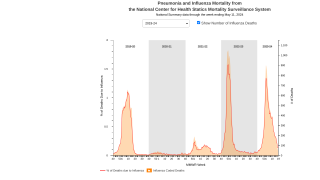Vaccinated Children Can Die From Influenza

The U.S. Centers for Disease Control and Prevention (CDC) and the National Center for Immunization and Respiratory Diseases recently reported two additional flu-related deaths, bringing the total number of pediatric deaths for the 2023-2024 season to 199.
As of September 18, 2024, this number equals the previous high reported during the 2019-2020 flu season. It's a profoundly tragic reminder that influenza can cause severe illness, even after a child has been vaccinated.
Before the recent pandemic, the record low for pediatric deaths in the U.S. was 37 during the 2011-2012 flu season.
The CDC's data also revealed that of the 158 children eligible for a flu shot, 131 (83%) were not fully vaccinated for whom vaccination status was known. Among these deaths, 126 were between 5 and 17 years of age and eligible for an annual flu shot.
CDC estimates show that flu vaccination last season reduced flu-related hospitalization by about 50% for vaccinated children.
Of the 189 pediatric deaths that were among children with known information on medical conditions, 49% had at least one pre-existing medical condition.
Unfortunately, influenza vaccine uptake among children lags compared to previous seasons.
Specifically, vaccinations for the 2023-2024 season (53.9%) for all children were about 2.2% lower than last flu season and 8.5% lower than in May 2020.
Adults are also getting fewer flu shots. The CDC reported that on May 25, 2024, about 48% of U.S. adults received a flu shot.
Regarding the vaccine choice, availability, and timing:
- Physicians, nurses, and pharmacists can offer patients up to nine influenza vaccines this flu season.
- And as of August 2024, about 158 million flu vaccines had been distributed during the 2023-2024 season. These vaccines are generally offered at health clinics and pharmacies beginning in August each year.
- Over the past thirty-six flu seasons, peak influenza activity occurred around January and February. This indicates that some children may need a second vaccination to ensure continued protection later in the flu season.
Regarding vaccine effectiveness (VE), a meta-analysis of studies conducted from 2017 through 2022 and published in the journal Vaccines in February 2024 showed real-world seasonal flu shots VE averaged 41.4%.
However, flu shot VE varied substantially due to factors such as virus type, age, health status, access to hospitals, and vaccination timing.
Both the CDC and the American Academy of Pediatrics recommend annual flu shots for all children without medical contraindications starting at six months of age.
Moreover, your healthcare provider can share local influenza season insights that can reduce vaccination concerns and future flu-related fatalities.
Our Trust Standards: Medical Advisory Committee
























